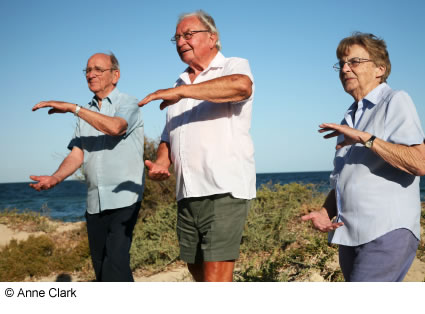 More than half of all older adults complain about having difficulties sleeping. Most don’t bother seeking treatment. Those who do usually turn either to medications, which can lead to other health problems, or behavior therapies, which are costly and often not available close to home.
More than half of all older adults complain about having difficulties sleeping. Most don’t bother seeking treatment. Those who do usually turn either to medications, which can lead to other health problems, or behavior therapies, which are costly and often not available close to home.
Â
Now, UCLA researchers report that practicing tai chi chih, the Westernized version of a 2,000-year-old Chinese martial art, promotes sleep quality in older adults with moderate sleep complaints. The study, which will be published in the journal Sleep, is currently available in the journal’s online edition.
Â
In the study, 112 healthy adults ranging in age from 59 to 86 were randomly assigned to one of two groups for a 25-week period: The first group practiced 20 simple tai chi chih moves; the other participated in health education classes that included advice on stress management, diet and sleep habits.
Â
At the beginning of the study, participants were asked to rate their sleep based on the Pittsburgh Sleep Quality Index, a self-rated questionnaire that assesses sleep quality, duration and disturbances over a one-month time interval.
Â
The study found that the tai chi chih group showed improved sleep quality and a remission of clinical impairments, such as drowsiness during the day and inability to concentrate, compared with those receiving health education. The tai chi chih participants showed improvements in their own self-rating of sleep quality, sleep duration and sleep disturbance.
Â
“Poor sleeping constitutes one of the most common difficulties facing older adults,” said lead study author Dr. Michael Irwin, the Norman Cousins Professor of Psychiatry and Biobehavioral Sciences at the David Geffen School of Medicine at UCLA and director of the UCLA Cousins Center for Psychoneuroimmunology.
Â
Irwin noted that 58 percent of adults age 59 and older report having difficulty sleeping at least a few nights each week. However, sleep problems remain untreated in up to 85 percent of people. And for those who do seek help, the usual remedy is a sedative.
Â
But sedatives can cause side effects, according to Irwin.
Â
“It’s not uncommon for older adults to experience daytime confusion, drowsiness, falls and fractures, and adverse interactions with other medications they may be taking,” he said.
Â
And while most health professionals generally agree that physical exercise enhances sleep quality, given the physical limitations of the elderly, rigorous exercise might not be an option. That’s why tai chi chih, with its gentle, slow movements, is an attractive exercise option for the elderly population.
Â
“It’s a form of exercise virtually every elderly person can do, and this study provides more across-the-board evidence of its health benefits,” Irwin said.
Â
The research piggybacked on a study published in April 2007 by Irwin that showed tai chi chih boosted the immune system of elderly people suffering from shingles (www.newsroom.ucla.edu/portal/ucla/Practicing-Tai-Chi-Boosts-Immune-7806.aspx).
Â
Other studies done at UCLA have shown that tai chi chih can help people who suffer from tension headaches and have suggested that it may aid in decreasing high blood pressure.
Source: UCLA
